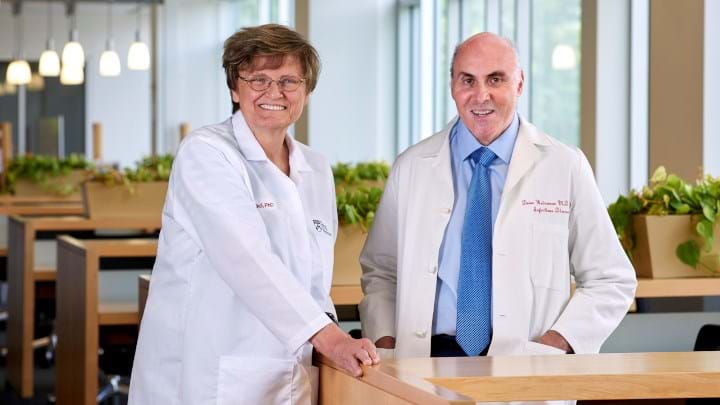Pennsylvania researchers win Nobel Prize in Medicine for mRNA work critical to Covid-19 vaccine development

NEARLY three years after the rollout of mRNA vaccines across the world, research pioneers Katalin Karikó and Drew Weissman have been awarded the Nobel Prize in Medicine for foundational discoveries that allowed their rapid development amid the Covid-19 pandemic.
Karikó, an adjunct professor of neurosurgery at the University of Pennsylvania, US, became interested in the potential of developing mRNA molecules as an effective therapy early in her career. However, working as an assistant professor at Pennsylvania at the time, she struggled to convince research funders of the significance of her project.
After a chance meeting in the 1990s, Karikó began working with Weissman, who was focused on dendritic cells, which have important functions in immune surveillance and activation of vaccine-induced immune responses. Weissman is currently Robert Family Professor of vaccine research at Pennsylvania.
Through their partnership, the researchers discovered that mRNA molecules could be modified and delivered effectively to the body to activate an immune response, publishing this key discovery in a 2005 paper. Genetic information encoded in DNA is transferred to messenger RNA (mRNA) which is then used as a template for protein production. The mRNA-based vaccines triggered a robust immune response, without the need for injecting a live or attenuated virus, as with traditional vaccines.
The Nobel Prize recognises that the partners’ groundbreaking findings contributed to the unprecedented rate of vaccine development in the wake of the Covid pandemic. The Pfizer/BioNTech and Moderna mRNA vaccines were made using their technology, licenced from the University of Pennsylvania, and started receiving approval for use less than a year after Covid began sweeping the globe. Including other vaccines that were quickly developed against Covid, more than 13bn doses had been delivered as of 19 September, according to the World Health Organization.
Both Karikó and Weissman are associated with Pennsylvania’s Perelman School of Medicine.
J Larry James, dean of the school, commented that Karikó and Weissman’s discoveries saved “innumerable lives and paved a path out of the pandemic”, noting that the same approach is being tested for other diseases and conditions.
The flexibility and speed with which mRNA vaccines can be developed paves the way for using the new platform for vaccines against other infectious diseases. There is also the possibility of using the technology to deliver therapeutic proteins to treat some cancer types.
Liz Magill, president of the University of Pennsylvania, said: “Katalin Karikó and Drew Weissman are brilliant researchers who represent the epitome of scientific inspiration and determination. Day after day, Dr Weissman, Dr Karikó, and their teams worked tirelessly to unlock the power of mRNA as a therapeutic platform, not knowing the way in which their work could serve to meet a big challenge the world would one day face.
“With the truest devotion to their field, they’ve already promised they will not stop here, and that is the greatest inspiration of all. Our Penn community is enormously proud of their groundbreaking achievements and this well-deserved recognition.”
For Karikó and Weissman, the Nobel Prize recognition follows multiple other national and international commendations. These include winning the 2022 Breakthrough Prize, an award renowned as the “Oscars of Science”, and the Albany Medical Center Prize in Medicine and Biomedical Research, one of the largest awards in the field in the US.
In recognition of the importance of her work following those early struggles, Karikó has been elected a member of six scientific academies for her breakthrough performance in medical technology, awarded honorary doctorates by 15 universities, and received more than 70 scientific awards and social recognitions.
Also a professor at the University of Szeged, Hungary, Karikó spoke virtually after the Nobel Prize announcement to professors and press gathered at the university. She advised students to pay attention to their physical and mental health and learn to manage stress.
Karikó said: "They should do what they do with joy because then they will get better at it! They should focus on what they can change.”
Recent Editions
Catch up on the latest news, views and jobs from The Chemical Engineer. Below are the four latest issues. View a wider selection of the archive from within the Magazine section of this site.




